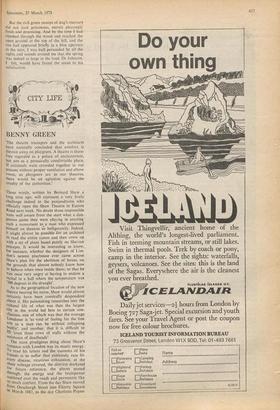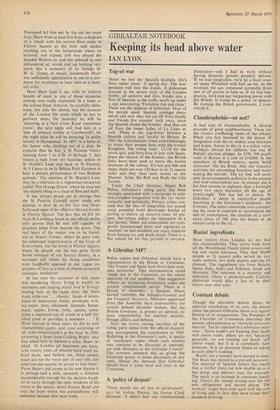CITY LIFE 13ENNY GREEN
'The theatre managers and the architects have naturally concluded that comfort is thrown away on playgoers. A theatre is there- fore regarded as a palace of enchantment, but not as a prosaically comfortable place. If criminals were crowded together in our Prisons without proper ventilation and elbow room, as playgoers are in our theatres, there would be an agitation against the cruelty of the authorities.'
Those words, written by Bernard Shaw a long time ago, will represent a very lively Challenge indeed to the panjandrums who officially open the Shaw Theatre in Euston Road next week. No doubt those responsible Were well aware from the start what a dan- gerous game they were playing in erecting such a monument to a man who expressed himself on theatres so belligerently. Indeed, It might almost be possible for an architect to read the entire canon and then come up With a set of plans based purely on Shavian Precepts. It would be interesting to know, for instance, whether the designers of Lon- don's newest playhouse ever came across Shaw's plan for the abolition of boxes, on the grounds that almost nobody knew how to behave when once inside them; or that he Was once very angry at having to endure a recital in a hall where the temperature was 200 degrees in the draught'. As to the geographical location of the new theatre bearing his name, Shaw would almost certainly have been comically despondent about it. His painstaking researches into the c.oltural life of what was then the largest City in the world led him to certain con- clusions. one of which was that the average Londoner is 'as void of feeling for the line a, rts as a man can be without collapsing bodily', and another, that it is difficult to fill 'even three rows of stalls without the assistance of deadheads'. The most prodigious thing about Shaw's romance with London was its manic energy. To read his letters and the memoirs of his friends is to suffer that extremely rare lit- erary disease, vicarious exhaustion, at the Sheer mileage covered, the districts docketed for future reference, the places passed through, the energy and thee, brainpower scattered over the roads and pavements like O much confetti. From the day Shaw moved from Osnaburgh Street into Fitzroy Square In March 1887, to the day Charlotte Payne-
Townsend led him out by the ear ten years later, Shaw lived at least five lives; a diagram of a wheel, with the second floor study in Fitzroy Square as the hub, and spokes reaching out to the hinterlands where he lectured, and argued, and was played the dreaded Brahms to, and was seduced in, and philandered at, would end up looking very much like a summary of an innings by W. G. Grace, of whom, incidentally Shaw was sufficiently appreciative to use as a syn- onym for excellence at least once as a musi- cal critic.
How Shaw kept it up, with or without benefit of meat, is one of those mysteries nobody ever really explained. In a letter to the actress Janet Achurch, he carefully delin- eates, not only his chores, but the nuances of the London life amid which he has to perform them. On Saturday he will be 'shivering in a New Cross Road committee room'; the next night will find him in a 'den of tobacco smoke in Camberwell'; on the night after he will be lecturing 'in polite society in Hampstead'. In 1897. in a letter to his future wife, ducking out of a date, he explains that he has 'a St Pancras Vestry meeting from 3 to 6.30, or perhaps 7; that means a rush from my Saturday article to St Martin's Lane and back to St Pancras. At 9 I have to be in Be!size Park Gardens to hear a private performance of two Brahms quintets.' The mention of St. Martin's Lane may be a reference to a vegetarian restaurant called 'The Orange Grove' where he once ate 'the nearest thing to a meal of flint and nails'. 'It has always struck me as strange that the St Pancras Council never made any attempt to cash in on the fact that Shaw fashioned most of his effective literary bombs in Fitzroy Square. The fact that he left his Ayot St Lawrence home as the official shrine only proves that he was still capable of practical jokes from beyond the grave. The real heart of the matter was to be found. not at Shaw's Corner, where he gave only his celebrated impersonation of the Vicar of Everywhere, but the hovel in Fitzroy Square, where he played out the last great Grub Street romance of our literary history, in a monastic cell where the living conditions were laughably opposed to our vague im- pression of him as a man of almost unnatural antiseptic tendencies.
At the time the occupant of that room was murdering Henry Irving in weekly in- stalments and making postal love to Irving's leading lady at the same time, the Shaw study table was chaotic : heaps of letters, pages of manuscript, books, envelopes, writ- ing-paper, pens, inkstands. journals, butter, sugar, apples, knives, forks, spoons, some- times a neglected cup of cocoa or a half-fin- ished plate of porridge, a saucepan . . If Shaw starved in those years, he did so with characteristic gaiety, and, most surprising of all, even romanticised it at the time. In 1894.
answering a letter from Golding Bright, who had asked how to become a critic, Shaw re- plied, 'In London all beginners are forty, with twenty years of obscure hard work be- hind them; and believe me, those twenty years are not the worst part of one's life, nor need you nor anyone be afraid to face them'. From Shaw's old rooms to his new theatre it is perhaps half a mile, certainly a distance inconsiderable enough for his derisive laugh- ter to carry through the open windows of his room in the square, down Euston Road and into the foyer where the panjandrums will solemnly honour him next week.











































 Previous page
Previous page